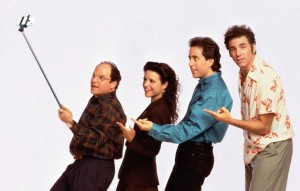Sein of the Times: “Seinfeld” 25 Years Later
 This year marks the 25th anniversary of the premiere of the first season of Seinfeld. (Not the actual first episode in technical terms. The actual first episode aired in 1989 under the title The Seinfeld Chronicles.) The “show about nothing” started with all the odds stacked against it; the first season order consisted of only four episodes – to date the shortest order for a season of a sitcom – and the episodes had to be paid for out of the pockets of an NBC exec. No one believed in it. But against all odds, Seinfeld became something no one, not even the cast and crew, ever expected it to be: successful.
This year marks the 25th anniversary of the premiere of the first season of Seinfeld. (Not the actual first episode in technical terms. The actual first episode aired in 1989 under the title The Seinfeld Chronicles.) The “show about nothing” started with all the odds stacked against it; the first season order consisted of only four episodes – to date the shortest order for a season of a sitcom – and the episodes had to be paid for out of the pockets of an NBC exec. No one believed in it. But against all odds, Seinfeld became something no one, not even the cast and crew, ever expected it to be: successful.
The show ended its run in 1998, and it went out on top, leading the Nielsen ratings and pulling in around 20 million viewers per episode in its last season. But, even after its finale, Seinfeld still has left a noticeable impact on pop culture and society. Several catchphrases have snuck their way into societal vernacular, like the term “double dip,” used to describe dipping something into dip after biting off of it, which came to famous use in season four’s “The Implant.”
In a decade full of genre-bending and massively popular sitcoms, Seinfeld managed to rise head and shoulders above all of them. The show brilliantly brought to light the awkward social obligations and situations we’ve all been exposed to. It put names to things we had experienced, but never actually named.
The core characters were caricatures of us, with all of our narcissistic tendencies exaggerated to an extreme level. No one ever cared about anyone else, no one ever learned from their mistakes, no one ever apologized for anything or did anything for a selfless purpose.
But the question remains: how has Seinfeld remained so popular today, over a decade after it went off the air, and in the midst of a vastly different world? The show was a snapshot of the 90s, and our superficial, self-absorbed narcissism. This is especially visible in the last couple seasons, chiefly the series finale. The show began to tap into a surreal sort of darkness, a darkness that changed the tone of the show. It became self-aware, guided by a team of top-notch writers. It wormed its way into our culture.
It’s commonly been called one of the best written TV shows of all time, and I have to agree with that. Look at episodes like season four’s “The Contest,” season five’s “The Marine Biologist,” or maybe season seven’s “The Soup Nazi.” The way plotlines converge and collapse is enjoyable to see, and even more enjoyable throughout consecutive seasons, as episodes became faster-paced and more elaborate. Another key feature of Seinfeld is the lack of overarching plotlines. As a “show about nothing,” episodes focused less on story arcs and more on trivializing everyday situations. Every episode feels fresh and relatable.
There was never any show quite like Seinfeld, and there may never be again…and there doesn’t need to be. The impact has been made, a deep crater on the societal subconscious. And, making a new Seinfeld for the sake of making it, for making a quick buck while riding the coattails of a decade-old success, would be a bad idea, akin to using butter as a shaving cream (“The Butter Shave,” season nine).


